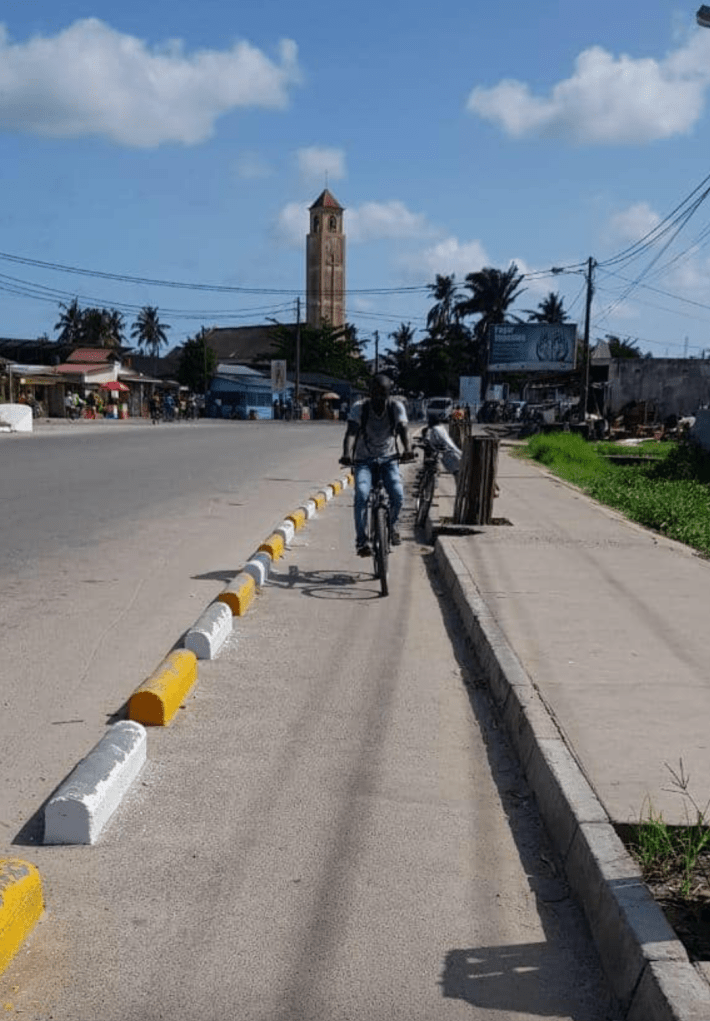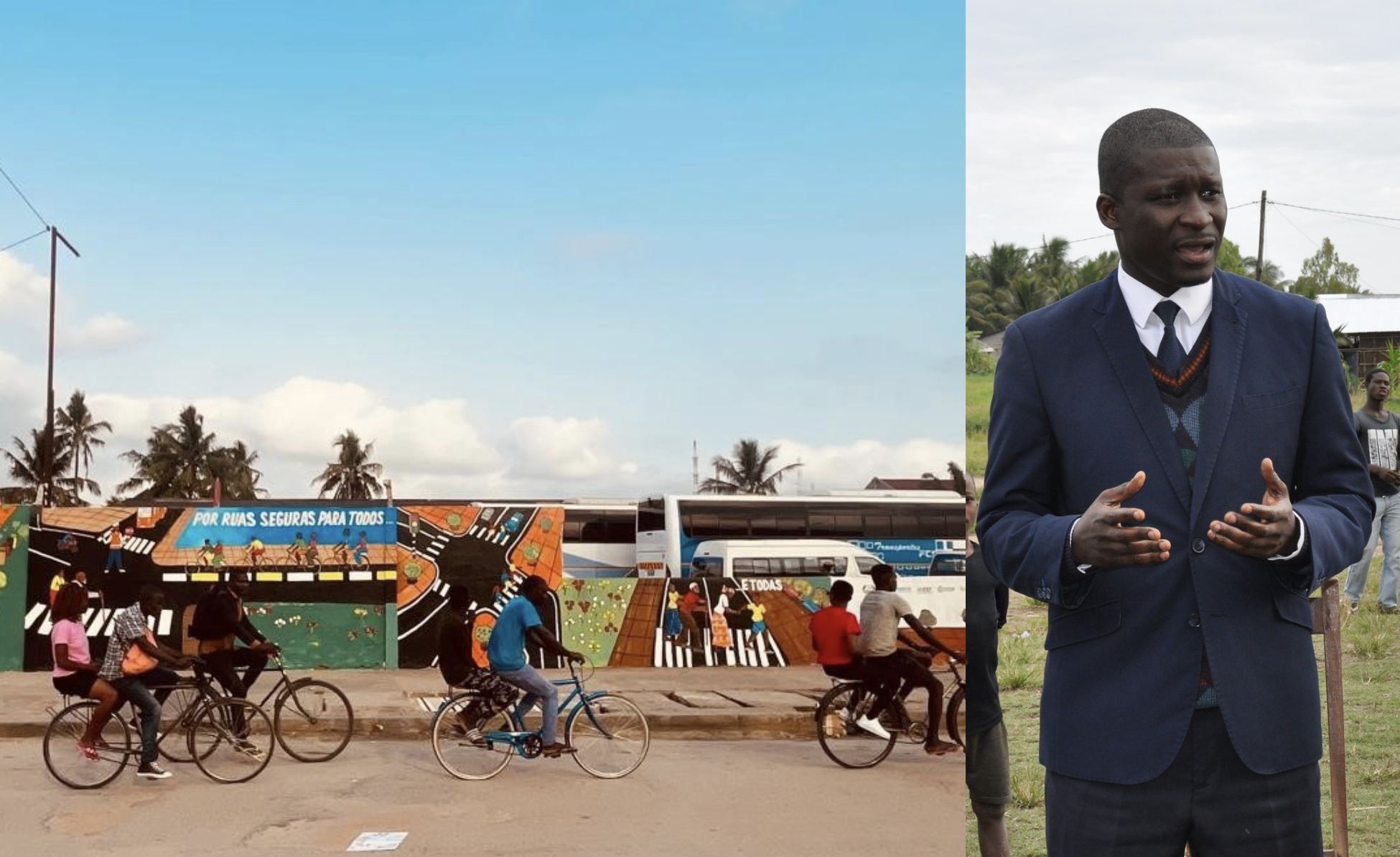Quelimane, Mozambique might not be the first place that comes to an American's mind when she thinks of an active transportation paradise. With 40 percent of trips taken on foot and 35 percent in the saddle, though, the east African city has already been ranked as the most walkable city on Earth — and now, it's setting its sights on becoming an international model for how to support people who walk and roll.
This week on The Brake, we continue our dispatches from Bloomberg Citylab with an inteview with Quelimane's mayor Manuel de Araújo. In his 13 years in office, the World Mayor Jury Award winner has made it his mission to elevate the status of his city's cyclists and use the bike as a tool for social change, even building the country's first cycle lanes with the help of a $400,000 grant from the Bloomberg Initiative for Cycling Infrastructure.
In the process, though, he's come up against many of the same cultural and political challenges that American advocates face, even in a wildly different landscape where car dependency hasn't yet taken hold — and his leadership could be a powerful example for the U.S. as we head into uncertain times.
Listen in below or anywhere you get your podcasts.
The following excerpt has been edited for clarity and length.
Streetsblog: How did Quelimane decide to become Africa's cycling city, and what was your journey to becoming the mayor who lead that transformation?
De Araújo: Well, I wish I could answer your question directly, because I was also surprised when the Economist published a report saying that Quelimane was the most walkable city in the world. Of course, it made us very proud; it showed that the world is looking at what we are doing in Quelimane. We've managed to improve the mode divisions between cars, bicycles and walking; finally, the world is recognizing the work we are doing in terms of creating infrastructure.

But the story about [how we became the biking capital of Afrida] didn't come from the front door. This story came from the back door, from the kitchen door — because in Mozambique, the kitchen is on the rear side of the house ...
In 2011 there was an election in my city, and some people approached me asking, why wasn't I thinking of running for the mayor? Because the former mayor was taken out on corruption charges, so there was a need for a fresh elections to replace him.
Well, at that time, I wasn't really willing to [run]. But the number of people asking me kept increasing, and at some point my dad asked me: "Manuel; why are people always coming here?' Because in the Chwabo culture, which is my African language, when people have got a very serious matter to deal with you, they come very early in the morning, like 4 a.m. or 3 a.m. The earlier they come, the more serious is the matter.
So my dad was like, 'Why are these people coming?' I was like, 'Well, they want me to run as a mayor.' And then I said, 'Well, Dad, you know, I live in UK; I have my job; I'm not accepting.' So [then] my dad asked me a very tricky question: 'Why did we send you school, and when your city needs you, are not ready?' That question, for me, was like a punch in the stomach. So I knew from that point on I couldn't say no any longer.
Before accepting, [though,] I created a small team, [and I asked them], 'Can you bring me a draft budget so I know how much money we will need?' Because I don't have that much money. And so they brought the budget, and when I looked, there was one item which was 10 times all the others put together: that was fuel.
I asked, 'Why so much money for fuel?' The logic at that time was that any candidate who wanted to show that he was very popular, he needed to invite all these [people with] motorbikes or with cars ... So I said, 'What about if we take out this budget?' And people were like, 'We can take out all other items, but not the fuel item ... Because if we cannot [fuel] 100 cars, then people will not take us seriously.'
I said, 'But we can. Why don't we do this using bikes?' And people thought I may be crazy — because bikes, at that time in my city, and those who are biking, were seen as second-class citizens. How can we go for a campaign showing that we are the outcast, that we are the second- or third-class citizens?
So my team refused, and I said 'Look: I will only run if we do it on my terms, on my conditions. And my term is that we used a bicycle is a symbol of our campaign, and I will not [spend] one single day in a car. I will either walk or use a bicycle.' ...
We won the elections. So the question then became: how can I thank those biking, because they helped me win the election? So said, 'I need to bring cycling into my agenda as my priority.' And I sat with [my constituents] and asked: What were their worries? What were their priorities? And their priority number one was lack of infrastructure in the city.
My city at the time had more than 400,000 inhabitants, and we didn't have a single traffic light. So you can imagine the chaos.

So the first thing I did as a public policy was to install traffic lights, then to put in zebra crossings. And then we became the first city in Mozambique to have cycle lanes, because at that time, if there was any accident between the car and the bicycle or a motorbike and the bicycle, the municipal police will always blame the cyclist. Because in their minds, roads were not made for those cycling; roads were made for cars. So we had to combat that stereotype.
And then when I won, when I took office, I started going to work using my bike. A couple of years later, biking was a symbol of my city, and everybody wanted to buy one because now it became a fashion. So we changed the perception. We brought into public policy those who were the outcasts, the second class citizens. I made it my priority.
Streetsblog: It's a beautiful story, and I have to say, many of the things you're saying feel very familiar to me, even as an advocate in the United States. But it's so interesting to think about these things from the perspective of an African city where you are not a car dependent community; you are a walking dependent community by many measures. Why do you think that bicyclists were considered second class citizens — before they became, as they now call them locally, the sons of the mayor, and the daughters of the mayor?
De Araújo: The dream of every poor person is to own a car. A car gives you status. A car brings you into the center of policy making, [because] the culture is a car-driven culture. Even the roads were built thinking of those with cars. So to change to change that paradigm, to change that culture, takes a lot of involvement; it takes a lot of public policy. But more than that, it takes determination and leadership and leading by example.






